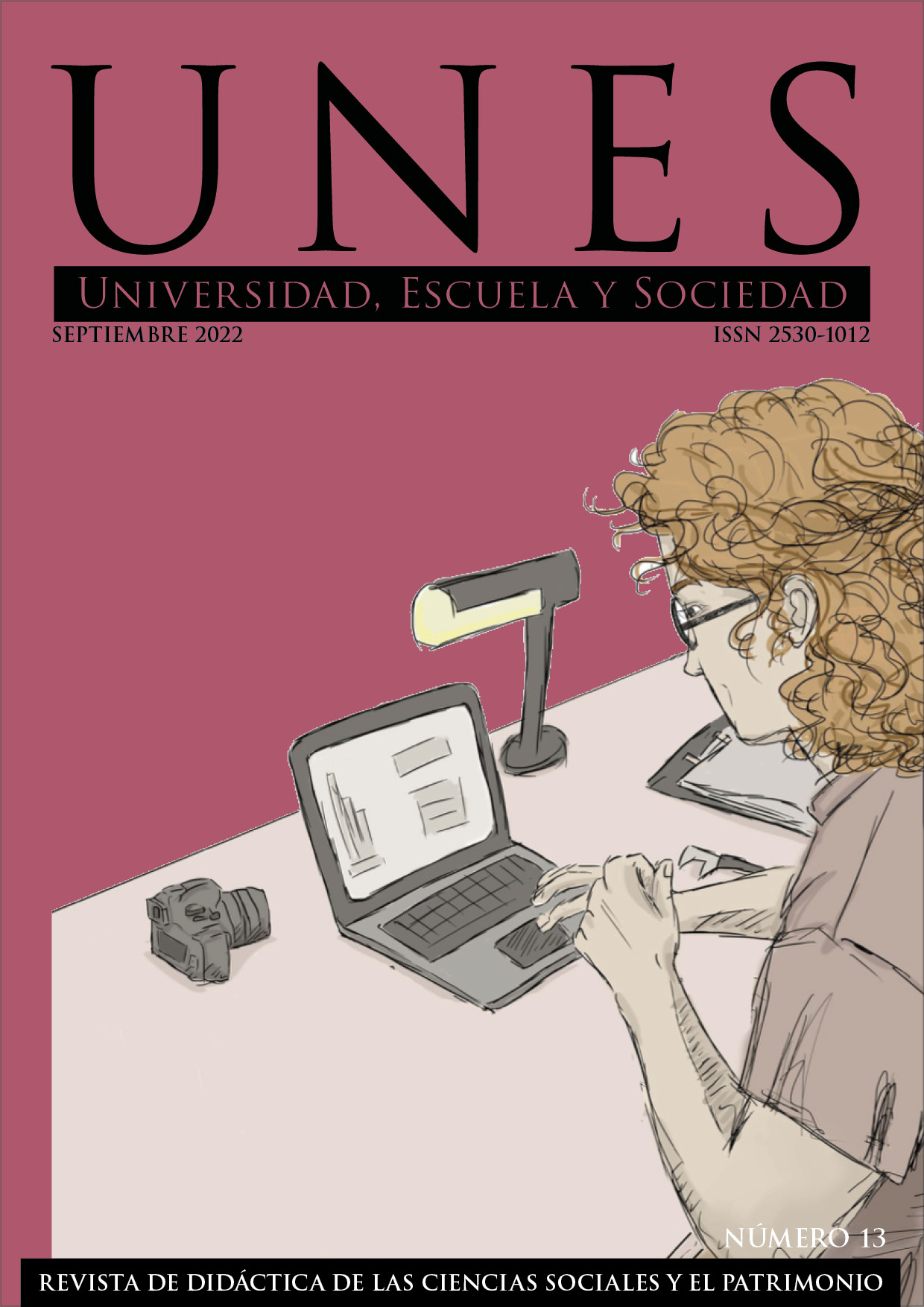Teaching on controversy: approaches for the polemic issues’ treatment on Geography and History course
DOI:
https://doi.org/10.30827/unes.i13.26143Keywords:
Education; polemic; Emotional Education; Social ScienceAbstract
Controversial issues are a basic topic nowadays, through this educational innovation program it is aimed to prove their didactic possibilities like a educative resource that bring closer the student’s reality to the educative scenario and stimulate their emotional and motivational development.
Downloads
References
Archibald, S., Rosenberg, D. (2004). The trouble with timelines. Cabinet Magazine (13).
Bodrunova, S., Blekanov, I., Smoliarova, A., Litvinenko, A. (2019). Beyond Left and Right: Real-World Political Polarization in Twitter Discussions on Inter-Ethnic Conflicts. Media and Communication, 7 (3), 119-132.
Cassell, M. (2018). When the World Helps Teach Your Class: Using Wikipedia to Teach Controversial Issues. American Political Science Association, 427-433.
Clarke, P. (2000). La enseñanza de temas polémicos. Green Teacher, 1-7.
Consejo de Europa (2015). Vivir con la controversia, cómo enseñar temas controvertidos mediante la Educación para la Ciudadanía y los Derechos Humanos (EDC/HRE). Ministerio de Educación, Cultura y Deporte, Subdirección General de Documentación y Publicaciones.
Crombie, B., Rowe, D. (2009). Dealing with the British National Party and other radical groups: Guidance for schools. Citizenship Foundation and Association for Citizenship Teaching, 1-16.
Derewianka, B., Coffin, C. (2008). Time visuals in history textbooks: some pedagogic issues. En L. Unsworth (Ed.), Multimodal Semiotics: Functional Analysis in Contexts of Education (pp. 187-200). Continuum.
Estepa Giménez, J. (2017). Otra didáctica de la Historia para otra escuela. Universidad de Huelva.
Fernández Berrocal, P., Ruíz Aranda, D. (2008). La Inteligencia emocional en la Educación. Revista Electrónica de Investigación Psicoeducativa, 6 (2), 421-436.
Ferrer Santos, U. (1996). La concepción postmoderna de la historicidad. Acción e Historia: el objeto de la historia y la teoría de la acción, 32 (4), 175-194.
González Gorosarri, M. (2017). Objetividad no es neutralidad: la norma objetiva como método periodístico. Estudios sobre el Mensaje Periodístico, 23 (2), 829-846.
Hand, M., Levinson, R (2012). Discussing controversial issues in the classroom. Educational Philosophy and Theory, 44 (6), 614-629.
Jungkunz, S. (2021). Political Polarization during the COVID-19 Pandemic. Front. Political Science (3), 1-8.
Junquera, N. (6 de febrero de 2022). La polarización se dispara y embarra la política. El País. https://elpais.com/espana/2022-02-06/la-polarizacion-se-dispara-y-embarra-la-politica.html
Mayer, J.D., y Salovey, P. (1990). Perceiving the affective content in ambiguous visual stimuli: A component of emotional intelligence. Journal of Personality Assessment (50), 772-781.
Mayer, J.D., y Salovey, P. (1993). The Intelligence of Emotional Intelligence. Intelligence (17), 433-442.
Mayer, J.D., y Salovey, P. (1997). What is emotional intelligence? En P. Salovey y D. Sluyter (Eds.). Emotional Development and Emotional Intelligence: implications for educators (pp. 3-31), Basic Books.
Misco, T. (2012). The importance of context for teaching controversial issues in international settings. International Education, 42 (1), 69-84.
Myhill, D. (2007). Reading the World: Using children’s literature to explore controversial issues. En H. Claire, C. Holden (Ed.), The Challenge of Teaching Controversial Issues, Stoke-on-Trent, Trentham.
Mujica, R.M. (2018). ¿Qué es educar en derechos humanos?. DEHUIDELA (15), 21-36.
Oxford Language (2016). Word of the Year 2016. Oxford Language. https://languages.oup.com/word-of-the-year/2016/
Riesco González, M. (2014). "Progreso", una idea controvertida en una sociedad paradójica. Educación y futuro: revista de investigación aplicada y experiencias educativas (30), 15-38.
Ruiz Moreno, D. (2002). Acercamiento a la percepción del tiempo y sus implicaciones en el estudio histórico. En Navajas Zubeldia, C. (Ed.) Actas del IV Simposio de Historia Actual, Logroño, 17-19 de octubre de 2022, 383-395.
Shor, I. (2006). War, Lies, and Pedagogy: Teaching in Fearful Times. Radical Teacher (77), 30-35.
Soley, M. (1995). If It's Controversial, Why Teach It?. Social Education, 60 (1), 9-14.
Stradling, R., Noctor, M., y Baines, B. (1984). Teaching Controversial Issues. Edward Arnold.
Toledo Jofre, M., Magendzo Kolstrein, A., Gutiérrez Gianella, V., Iglesias Segura, R. (2015). Enseñanza de ‘temas controversiales’ en la asignatura de historia y ciencias sociales desde la perspectiva de los profesores. Estudios Pedagógicos UACH, XLI (1), 275-292.
Turan, I. (2020). Thematic vs Chronological History Teaching Debate: A Social Media Research. Journal of Education and Learning, 9 (1), 205-216.
Woolley, R. (2011). Controversial Issues: identifying the concerns and priorities of student teachers. Policy Futures in Education, 9 (2), 280-291.
Downloads
Published
How to Cite
Issue
Section
License
Copyright (c) 2022 Francisco Sánchez Tenedor

This work is licensed under a Creative Commons Attribution-NonCommercial-ShareAlike 4.0 International License.
Authors being published in this journal agree to the following terms:
The authors retain their copyrights but guarantee the journal's right to be the first publisher of the work, licensed under a Creative Commons Attribution-NonCommercial-ShareAlike 4.0 International license, which allows others to share the work, provided that they acknowledge its authorship and initial publication in this journal.
Authors may separately subscribe additional agreements for the non-exclusive distribution of the work published in the journal (for example, including it in an institutional repository or publishing it in a book), with recognition of its initial publication in this journal.
Authors are allowed and encouraged to disseminate their work electronically (for example, in institutional repositories or on their own websites) before and during the submission process, as this may result in productive exchanges, as well as more and earlier citations of the works to be published (See The Effect of Open Access) (in English).






 ISSN-e: 2530-1012
ISSN-e: 2530-1012









